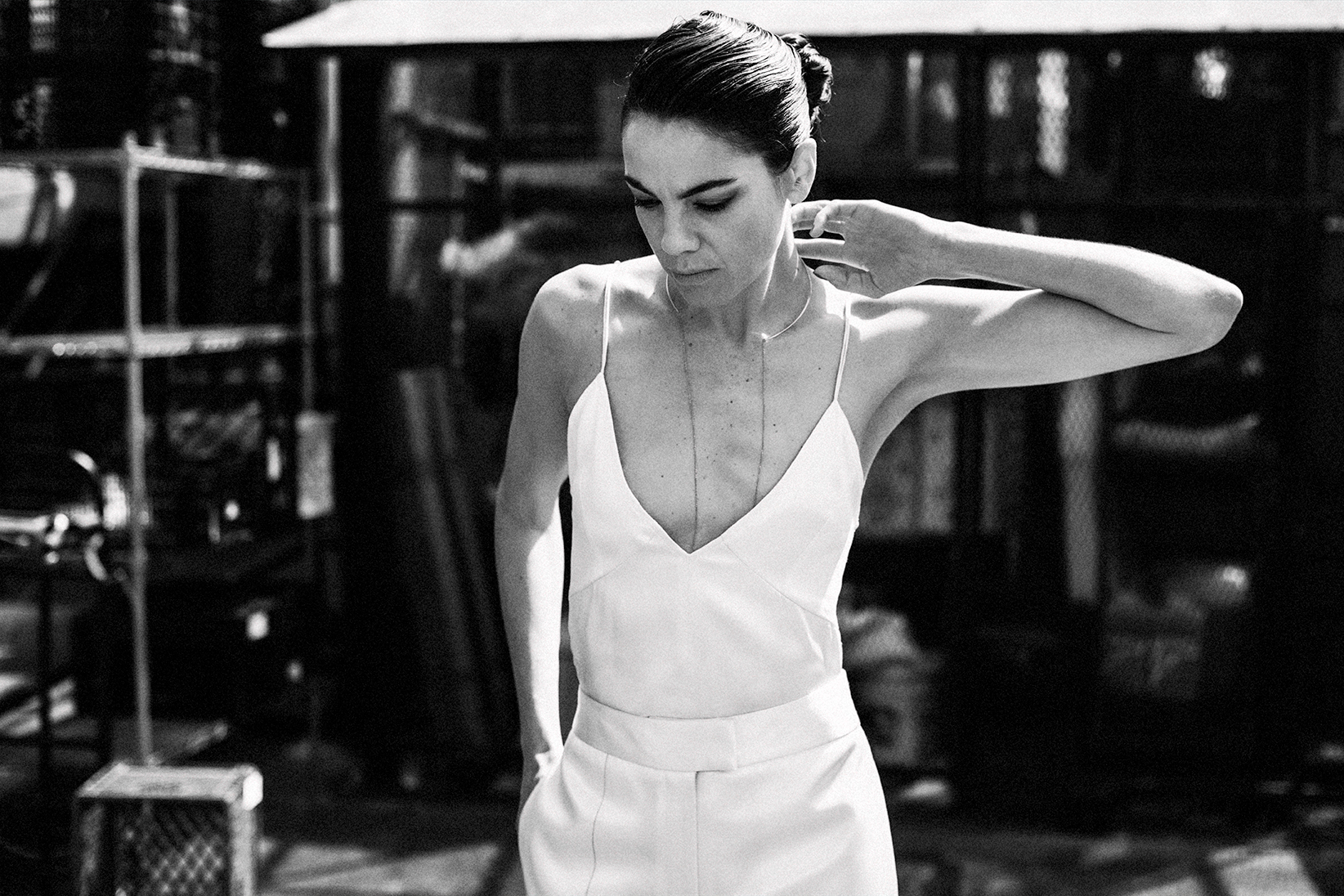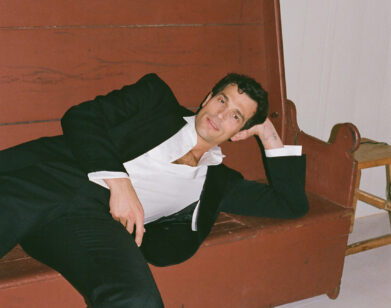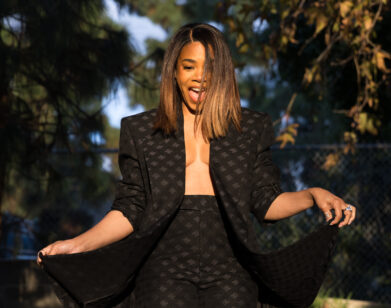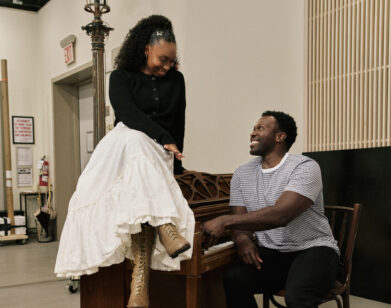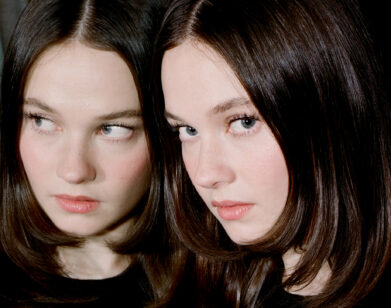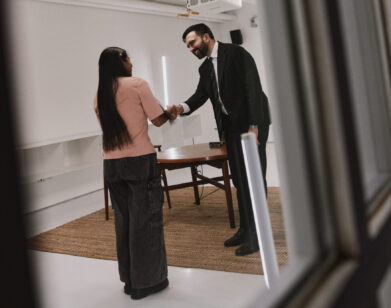Michelle Monaghan
MICHELLE MONAGHAN AT L&E OYSTER BAR IN SILVER LAKE, LOS ANGELES, MARCH, 2016. PHOTOS: BRIAN HIGBEE. STYLING: DANI + EMMA. HAIR: DENNIS GOTS/THE WALL GROUP. MAKEUP: NICOLE WALMSLEY/THE WALL GROUP FOR CHANEL. MANICURE: KAIT MOSH/CLOUTIER REMIX.
How do you follow the first season of True Detective? Between a director of the caliber of Cary Fukunaga, co-stars like Matthew McConaughey and Woody Harrelson, and the modern gothic setting of the Louisiana bayou, it is not an easy task. Actor Michelle Monaghan, however, has found a solution in the new Hulu drama The Path.
Set in present-day suburban America, The Path centers around a cult—or, as the members insist on calling it, a movement —called Meyerism. Like other famous fringe religions, Meyerists are guided by the writings of a mysterious leader, and as they advance, they are given more and more information about the ultimate truth. Monaghan plays Sarah, a woman born and raised within Meyerism. Calm, clever, and devout, Sarah is a key figure in the movement. But when her husband Eddie (Aaron Paul) and son Hawke (Kyle Allen) begin to have doubts about their beliefs, and her childhood friend Cal (Hugh Dancy) starts acting erratically, Sarah’s world disintegrates around her. With two episodes left in the first season, it seems as though Sarah has lost everything she cares about outside of her faith.
Now 40, Iowa-native Monaghan has been acting professional for 16 years. She’s appeared in big blockbusters like Mission Impossible: III, romantic comedies (Made of Honor), family films (Pixels), and gritty indies (Gone Baby Gone, Fort Bliss). Her turn as Sarah, however, is a turning point, dark, urgent, and uncompromising. Here, Monaghan talks with her good friend and former co-star Josh Gad.
JOSH GAD: Is this Michelle Monaghan?
MICHELLE MONAGHAN: The one and only.
GAD: Or is this Michelle Moynahan?
MONAGHAN: [laughs] No, please. I would have remembered if I’d slept with Tom Brady. You and me both, right?
GAD: I would remember Tom’s deflated balls anywhere. I’m so excited that they asked me to guide this interview with you; there is so much that I’ve been meaning to ask you for the past three years.
MONAGHAN: So let’s do it publicly.
GAD: Michelle, what is your sex life like? These questions are very personal…
MONAGHAN: I would say it’s healthy.
GAD: Good. Kind of like my diet. First off, The Path is unbelievable, so congratulations. I’m excited about it because I’m thinking of converting from Judaism to Meyerism.
MONAGHAN: I highly recommend it.
GAD: It feels like it would be good for me.
MONAGHAN: We practice complete transparency, which means we don’t hide secrets from anyone. For you, who has no filter whatsoever, I feel like you’re already kind of practicing. I think you’d climb the latter quite quickly.
GAD: My motto has always been, “If it’s good enough for Michelle Monaghan, it’s good enough for America.”
MONAGHAN: That will get you through life.
GAD: It’s absolutely true. So do you remember the first time we met on Pixels? Do you remember what your first impression was of me?
MONAGHAN: No, what was it?
GAD: To be honest, I’ve sort of blocked that period out of my life. I remember it as being a dark period.
MONAGHAN: It was hardly. I cannot recall the last time, if ever, I’ve laughed as much as I did than when we were making that movie.
GAD: We bonded pretty quickly.
MONAGHAN: Very quickly.
GAD: We had our families and it was just a big playground.
MONAGHAN: We basically ate our way through that shoot if you recall.
GAD: We did. I’m actually still spending thousands of dollars on health and fitness because of that film. I see you at our gym all the time and it inspires me. I keep thinking, “If I keep going the way that I’m going, I’m going to have your body one day.”
MONAGHAN: [laughs] For anyone reading this, they must follow you on Instagram and your daily routine at the gym because it’s absolutely hysterical.
GAD: Do you look at me?
MONAGHAN: I stare at you constantly.
GAD: So Michelle, you grew up in Iowa, home of the first caucuses. What was that like? Was it more suburban or rural?
MONAGHAN: It was very rural. I grew up in a town of 700 people, so we had no stoplight; my high school graduating class was 39 people. It was such slim pickings that I basically had one boyfriend all through high school. I didn’t grow up near a movie theater—it was 50 miles away—so I didn’t even really grow up watching movies.
GAD: So you becoming an actress was sort of you rebelling against your town?
MONAGHAN: It was a complete and utter fluke. But when I look back, in high school I did something called speech, and we did debate.
GAD: I did speech and debate! You know, that I won the national speech and debate tournament three times. Does that impress you?
MONAGHAN: Did you really?
GAD: I really did. That’s actually not something I should brag about. It’s really sad. I was a geek.
MONAGHAN: That’s amazing. I didn’t know I was creative. That was, unbeknownst to me, an outlet that I was in search of. I remember enjoying it immensely, but I never saw the big picture. I never thought, “Oh wow, the next logical step would be to go to drama school.” You went to drama school, right?
GAD: I did go to drama school. Were you like Sofia Vergara is to Colombia to Iowa?
MONAGHAN: [laughs] Exactly. My boobs are slightly smaller.
GAD: Have you seen the movie Zootopia?
MONAGHAN: No I haven’t.
GAD: You remind me…
MONAGHAN: Of the sloth? Because I hear about the sloth all the time from my kids.
GAD: No, you don’t remind me of the sloth. You remind me of the bunny rabbit who leaves small town, rural, corn husking and goes out into the city world and becomes a star. I think they ripped off your life a little bit. Whoa. It says here that you won blue ribbons as a hog wrestler when you were 13?
MONAGHAN: [laughs] Yes. I know Sofia Vergara doesn’t have that on me. Did I mention I come from a very rural area?
GAD: Apparently.
MONAGHAN: At our local county fair, a really fun competition during the summer would be for you and a friend to go into a big pen full of mud—it’s probably about 20 feet in diameter and a foot deep. You get put in there with a big pig, and inside that pen with you and the big hog is a big barrel, and you chase the hog around, and you get it by all four of its legs, and whoever dumps it into the barrel the quickest wins. I’m quick on my feet.
GAD: Wow. Do you know what they call that today?
MONAGHAN: Oh no. Tell me.
GAD: They call that child abuse. Putting you in a pen with a hog…
MONAGHAN: I think they’re still doing it.
GAD: Is that something innate in you—you want to go back and teach the hogs of rural Iowa a lesson?
MONAGHAN: I hadn’t thought about that in many years and then I was home a couple of years ago and I was looking through the photo albums, and my mother has a picture of me in cutoffs and a t-shirt with my best friend growing up. We’re covered in mud from head to toe, all over our faces, holding blue ribbons.
GAD: [laughs] Do you ever get regretful when you’re eating a piece of bacon that you should’ve had a chance at that son of a bitch before he died?
MONAGHAN: It’s just one of those things that happens in rural places when you have nothing else to do.
GAD: In The Path, your character has a teenage son who rebels against his parents by dating a girl who doesn’t share his religious beliefs. Were you a teenage rebel?
MONAGHAN: I was a pretty good kid, but once I messed up. I came home drunk when I was 16 or 17. It was the first time I went out drinking, and I came home and I stumbled up the steps.
GAD: Was it moonshine?
MONAGHAN: It was Black Velvet and Coke. It’s lighter fluid, basically. To all the kids out there, don’t do it!
GAD: All you little 10-year-olds who are reading Interview magazine, don’t try that at home.
MONAGHAN: I came home around two in the morning. I remember tracking in mud because we’d been out in the middle of a field—so cliché—on a combine drinking.
GAD: This is great. I feel like you were in Friday Night Lights.
MONAGHAN: It was totally Friday Night Lights. Exactly. So I came home, I stumbled up the steps, and I tracked mud everywhere. My dad was kind of snickering on the front porch swing, and my mom was like, “You hightail it and get into bed and we’ll talk about this in the morning.” Then I remember my mom waking me up at seven o’clock and I was so sick, I was so hung over. And she was like, “You get your butt downstairs right now and you hose down the steps on the front porch and then you’re going to go to church and you’re going to ask for forgiveness, and then you’re grounded for the rest of the summer.” I was grounded for the rest of the summer! I didn’t do anything for the next six to eight weeks. So was I a rebel? I was a rebel one time and then it never really happened again.
GAD: Your parents learned you a lesson. I love that your mom used the term, “hightail.” I don’t think my mom has ever said “hightail” to me. I regret that I never had those words uttered by a parental unit.
MONAGHAN: Now were you a rebellious child? Were you a good kid or did you get into trouble?
GAD: I was a good kid. I was respectful. I had the same sort of thing, though. I came home completely blitzed when I was about 16 and that did not go over well. We didn’t have cell phones back then and my mom couldn’t reach me, and she was not happy. I got the same punishment but without the same illustrative terms that you were given. Before becoming an actor, you studied journalism and you were a model. How did you go from modeling to acting?
MONAGHAN: The summer that I was grounded, the one thing that got me out of my bedroom was a family trip that we took to Chicago to see a Cubs game. It was the first time I’d seen a big city, and when I saw that skyline and all the people, I just knew that’s where I wanted to live and go to college. But I also knew that if I wanted to go to college, I was going to have to put myself through school. I come from a very humble place, my parents are working class—my dad’s a farmer—and I knew that it was going to be my responsibility. At the same time, I was coming into my own as an adolescent, and people were like, “Your daughter could model. Your daughter is a pretty young girl.” I went to Chicago where I had met this modeling agent, who was like, “You could model for Montgomery Ward and Target.” I started going there during the summers and I made money. I was the girl in your local Sunday paper and you didn’t even know it, Josh.
GAD: It’s like The Usual Suspects. All the pieces are finally coming together for me.
MONAGHAN: [laughs] I’d always wanted to be an investigative journalist—that was my dream growing up. In my family, we were always very politically informed and up on our current events, and we sat around the table and we talked. I was really intrigued by the outside world because I felt like I lived in a bubble, and I had a very idealistic view of the world. I studied in Chicago and modeled. I was starting internships and I wasn’t really excited about journalism anymore. I got the feeling that it was more about creating a story instead of finding the story. At the same time, I went through a terrible breakup, so I moved to New York. This was boyfriend number two, a total bad boy.
GAD: It was Kiefer Sutherland, wasn’t it?
MONAGHAN: You got it. It was Kiefer Sutherland. I had to get away from Kiefer, so I moved to New York. You know that’s going to turn out that I used to date Kiefer Sutherland.
GAD: Totally. And he was a bad influence on you.
MONAGHAN: I started doing commercials when I was in New York and then a television audition came by my modeling agency. My agent said, “You should go in and audition.” It was for this show called Young Americans with Kate Bosworth and Kate Moennig and Ian Somerhalder. It was on the WB years ago. I got the gig.
GAD: Do you remember that audition?
MONAGHAN: I vaguely, vaguely remember it. I must have just been reading the pages. For whatever reason—maybe they were desperate—I got the gig. I was so green. I had no idea what I was doing, “What do you mean? What’s a mark?” I’d never taken an acting class or anything in my life, so I really was totally clueless, but we had such a fun time. When I finished that gig, it was maybe three or four episodes, I came back to New York and I thought, “I better find an agent.” I met a bunch of agents and I met my beloved agent Bonnie Bernstein. I went in and I said, “Listen, I don’t know what I’m doing, but I think maybe I’m supposed to do this. I’ll work really hard.” And she said, “I believe you, let’s give it a shot.” That was it.
GAD: You’re that actor that everybody who hasn’t made it hates. It couldn’t of have been that easy.
MONAGHAN: I think I had a couple of things going for me: It wasn’t something that I’d always known I wanted to do, it really was something of a journey that I was on. I’ve always been a person who’s seized an opportunity, and I’ve never felt limited by my circumstances, no matter what they were. Even when I was living in Iowa, it wasn’t like I had big dreams, but it wasn’t that I felt I couldn’t have any. I always felt very capable. Secondly, there is nothing worse than being told no as a model because they’re so cruel to you, so when I started auditioning [for acting roles], it rolled right off of my back.
GAD: You didn’t have anything to lose.
MONAGHAN: I didn’t have anything to lose. I had that thick skin. I had older brothers that I grew up with too, so my thick skin was fully in place by the age of 10. I think that’s one of the things that really aided me in terms of my early success. It never really bothered me: “Okay, I didn’t get this one. Onto the next.”
GAD: Have you ever had to really fight for a role?
MONAGHAN: God yeah. And I love that. I like it when I go in and I audition and I get the job, because that way, I know when I turn up on that first day, I earned it, they want me to be there. They know what I’m going to do creatively.
While it’s a privilege to be offered something and just sign onto to do it, I have this complete and utter fear whenever I turn up to one of those jobs that on that first day when they roll the cameras and I open my mouth, they’ll be like, “Shit. That is not what we wanted.” So I actually really enjoy that process of auditioning and fighting for a role, because you feel like you’ve earned your place and creatively they’ve given you permission to do what you want to do.
GAD: Do you remember a specific role where you had to fight convince the director or producers? How did you do it? Did you hogtie them and put them in a bath of mud and beat the shit out of them?
MONAGHAN: [laughs] One particular instance was a film that I was cut out of ultimately, a movie called Syriana with Stephen Gagan. It was one of those situations where they were adamant—or Stephen was very adamant, and he had written it as well—that this particular character was blond. She was a pageant queen and she had to be blond. I have black hair naturally, and so I said, “Alright. I’ll go to the salon, dye my hair, take the red-eye out to L.A. and audition in the morning.” It was one of those things where Bonnie was like, “Really?” And I was like, “Yeah!”
GAD: God bless you.
MONAGHAN: I’ve done that sort of thing so many times. I think you have to be willing to do that as an actor, because as right as I am for the job, there are 10 other young, talented women that are also right, and unless you’re willing to go that extra mile, you’re not going to necessarily get that opportunity. I went in, I got the gig, and then I got cut out of the movie. So there you go. Moral of the story! But those are things where you walk away tall and proud and go, “I’m so glad I did that.” I remember when I had the audition for Kiss Kiss Bang Bang to read with Shane [Black]. It was the first audition. I remember flying into L.A. to read with him, and right before I went into the audition, I called Bonnie, because I was thinking, “There’s not way I can do this. This is totally over my head. It’s just too much.” It was a really rich and colorful character and I had never done anything to that extent before. Her assistant said, “Yeah, hold on.” And I’m waiting there for her on the phone. It must’ve been a good 30 seconds, and in those 30 seconds, that fear made me go, “No, you have to do it.” I hung up the phone and I went ahead and did it. But those moments when you tell yourself no are the moments that are the game changers.
GAD: That’s what I love about you so much. You are going to fight for everything and you don’t feel like you’re owed anything. It’s not going to come you, you’ve got to take it and work with it.
MONAGHAN: Maybe that’s from my upbringing as well. My parents have worked their asses off their whole entire lives, they still do, and I never felt like anything would be handed to me. I never felt sorry for myself. I felt like, “Wow, this is incredible. I’m able to do this for myself.” I think once you have that sense of empowerment at a young age and you allow your children to have that empowerment, it will fuel them for a lifetime. Are you crying yet?
GAD: I am. I’m thinking of moving my children to Iowa and becoming a farmer. I feel like that’s the only way I’m going to raise a child as good as you.
MONAGHAN: Meanwhile I’m trying to get my daughter to make her bed every morning.
GAD: [laughs] So, True Detective for a second. It was such a huge hit, it hit the zeitgeist in such a big way, everybody was talking about it. Do you feel like that changed your career at all?
MONAGHAN: I suppose it did. I knew when we were making it that it was something special. You could feel it in the room. There are special projects that you do where you know that everything is firing on all cylinders. But once you see the final editing and the music—it blew me away as well as audiences. I think it was seen by so many people, and that’s what kind of surprised me. I didn’t realize the scope that HBO had or that TV had, because I hadn’t really worked in that medium before. It also ruined me because it was so good. I had such a positive experience on it; I wanted to get back to something like that again. I was looking for something to do, but everything paled in comparison.
GAD: I would imagine so.
MONAGHAN: The Path was the first project that I felt like I could get into and go on the journey with and do it for a number of seasons if possible. I felt it was a really unique world and had the potential to be really provocative and scary and mythological. I’m a huge fan of [one of the producers] Jason Katims, so it helped me and it definitely changed me, because it just gave me a different perspective on working in that kind of medium. Creatively, it challenged me to do find something as good.
GAD: When you signed on to play Sarah, did you know the whole arc for the first season?
MONAGHAN: I didn’t and that was quite scary for me. When I did True Detective, I had all the episodes it was really just a big, long movie—and there was a great comfort in knowing where the character went and how she changed.
GAD: But it’s very unusual.
MONAGHAN: It is unusual. And that was one of the things that I found difficult about wanting to jump on board with anything, because I wasn’t completely sold on those first few episodes that people would give me. I was like, “I just don’t see the bigger picture,” and my comfort level wasn’t there. So it was, pardon the pun, a leap of faith. They gave me somewhat of an outline, but it was really about that feeling that I had with them in the room and how they wanted to explore all of these different ideas and have it be centered around family so it was really grounded and relatable and then push it to the extreme in certain areas. Then once I knew that they were talking about someone like Aaron [Paul], that was amazing, because I love that dude beyond, beyond words.
GAD: More than me?
MONAGHAN: Not more than you. Not possible.
GAD: Okay good. Thank you.
MONAGHAN: But he’s such a good person and we work very much the same creatively, so I just felt like it had all the pieces of the puzzle there.
GAD: Speaking of the puzzle, your character has an amazingly rich backstory. You have this complicated relationship with Hugh Dancy’s character Cal, whom you’ve known your whole life. Your sister defected from the Meyerist movement; you haven’t seen her since. Did you talk about this with the showrunners? Did you establish a detailed timeline or backstory? Was their room for that sort of input?
MONAGHAN: Those are little things that I discovered, and it was really hard to do research for it.
GAD: You went to medic training for Fort Bliss and trucker school for Trucker. What did you do for Sarah?
MONAGHAN: That was the thing. I couldn’t join a cult. Normally I like to do something tangible to really understand the livelihood of this person or the culture that they live in, but I couldn’t with her, so it was more trying to discover her emotional journey. I wrote about my own experience with my own faith. I grew up Catholic. I’m not religious now but I would say that I’m a very spiritual person and you’re always in search of answers. I really wanted to understand someone that could be so devout, so convicted and come from a place of complete and utter faith, that they would, no matter what, choose their faith over their family. I really got to thinking about people who have a lot of faith and I find people, when they’re in that element, exude a lot of serenity. They have tremendous strength and a tremendous sense of control because they’re secure in what they have faith in. I thought what would be interesting was to see Sarah very calm and cool and collected, and then when things go a little awry, a little off within their family, and all of those healing practices and those unburdening processes that she’s accustomed to using to get through situations aren’t working, we start to see her unravel. I had to really take it from more of an emotional perspective to see who this person is and who this person was going to become in terms of the research. Once I started getting bits of information—that we excommunicated the sister from our family—then it started becoming clear that there could be this layer of her that was quite dark. If the son decides to leave the family because he’s having doubts about his faith, she would be the ultimate tough-love matriarch and say, “Go and I’ll never speak to you again.” I liked that religion is something that is very well intentioned, for all intents and purposes, for everyone around the world, but sometimes it can start to get warped. What I love about the show is that it explores what people do in the name of religion for good or for bad.
GAD: I checked out for the whole last answer. Could you just repeat that one last time?
MONAGHAN: [laughs] You’re such an asshole.
THE PATH AIRS WEDNESDAYS ON HULU. JOSH GAD IS AN ACTOR, PRODUCER, AND WRITER WHOSE CREDITS INCLUDE FROZEN, THANKS FOR SHARING, AND PIXELS. NEXT YEAR, HE WILL APPEAR IN BEAUTY AND THE BEAST ALONGSIDE EMMA WATSON, EWAN MCGREGOR, AND EMMA THOMPSON.

